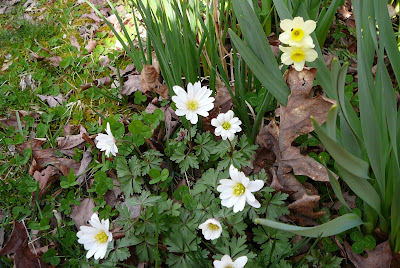I had the wonderful opportunity yesterday to attend a semi-public bird banding event organized by John Gerwin who is the Curator of Ornithology at the NC Museum of Natural Sciences. John specializes in studying painted buntings and other neo-tropical migrants. He also seems to specialize in taking students and young birders under his wing (forgive me, it's too perfect), here he is with a group of disciples, holding a tiny wren in his left hand, explaining the steps to process a bird for scientific purposes.

John has a wry sense of humor, is tremendously patient and never seems to fluster, especially when holding a fragile bird between his fingers in a "bander's grip", something that makes me nervous and jumpy and a little afraid of injuring the bird. I'm also troubled feeling the stress that I know the bird is experiencing in the process. I still want to learn to do this thing, even though it makes me scared, John says he has often seen people cry the first time they hold a bird, it is such an intense sensation.
Yesterday there were somewhere between 30-50 people out at the
Prairie Ridge Eco Station, a 45 acre parcel owned by the Museum. The land is planted in prairie and trees to create habitats that attract birds and for various research purposes. When banding is underway, fine meshed mist nets are set up across the area to capture birds as they fly past, they cannot see the net and are captured and hang there, until one of those adept at removing birds from nets appears to gently remove the bird. Often their feet, wings or heads are tangled, but they are generally removed unscathed, perhaps a feather bent or out of place, some squawking, some biting, some quietly awaiting their fate, they are slipped into white cloth bags which calms them until they are taken back out at the banding station.
A hermit thrush having its wing measured
Brown thrasher waits while the correct band size is determined
Head first, the birds are placed in film cans or pill bottles to be weighed
A flicker; tail feathers help determine age
Blowing on the feathers to reveal the skin,
Helps tell whether the bird is breeding, how much fat is under the skin, the age of the bird and if it is molting
Natalia and flicker posing for the camera
Ready to fly
I was so impressed by the skill and knowledge of everyone working out there yesterday and every time I'm involved in a citizen science or environmental education activity like this it gives me great hope for the future. When I see young people- like Natalia above- eager to work on advanced degrees in science, I'm inspired.
Young girl releasing a field sparrow
Parents introducing their kids to nature, bringing them to an event like this, is so important The children were excited and ready to jump in and learn. I feel lucky to have the opportunity to participate in these projects and to learn some of the science of birds from pros like John and Natalia. Birds-truly winged wonders- provide me with hours of pleasure as I watch them in my yard and around the country. I am incredibly grateful to have this kind of chance to study them up close.



































